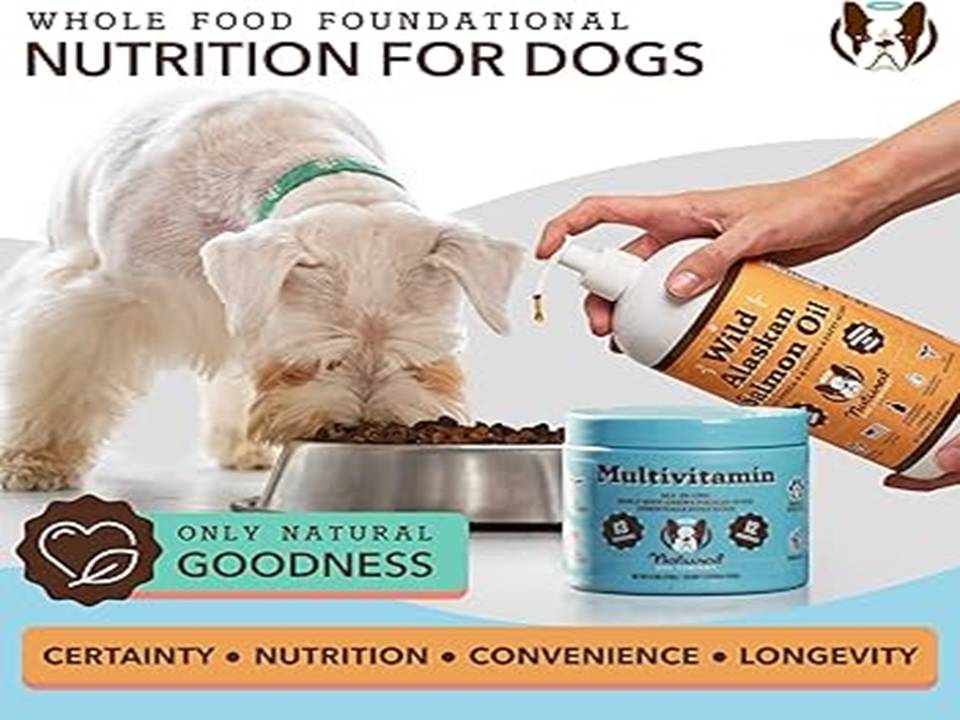Dog Supplements
Proper nutrition plays a critical role in maintaining a dog’s overall health and well-being. While high-quality dog food generally provides the essential nutrients a dog needs, certain health conditions, life stages, or specific dietary needs may necessitate the use of supplements. Understanding which vitamins, multivitamins, and other supplements are beneficial—and knowing how to administer them properly—can improve your dog’s quality of life. This guide explores the importance of supplements for dogs, their types, and how to choose the best options for your pet.
Table of Contents
- Why Dogs May Need Supplements
- Essential Vitamins for Dogs
- Multivitamins for Dogs
- Other Important Dog Supplements
- Choosing the Right Supplement for Your Dog
- Conclusion
Why Dogs May Need Supplements
Dogs, like humans, may experience nutritional gaps due to diet, age, or specific health issues. Supplements can help bridge these gaps, ensuring they get all the nutrients they need to support.
Joint health: Supplements like glucosamine and chondroitin support joint health, particularly in aging or large breed dogs prone to arthritis.
Digestive health: Probiotics and digestive enzymes help maintain a healthy gut and reduce digestive issues.
Skin and coat health: Fatty acids like Omega-3s promote a shiny coat and prevent dry, itchy skin.
Immune function: Vitamins and minerals strengthen the immune system and improve overall resilience to diseases.
While most dogs don’t need supplements if they’re consuming balanced, commercial dog food, certain dogs may benefit from them, especially those on homemade diets, senior dogs, or pets with specific health concerns.
Essential Vitamins for Dogs
There are six major vitamins essential to a dog’s health:
Vitamin A
Role: Supports eye health, immune function, and reproductive health.
Sources: Found in liver, fish oils, and carrots. It is often included in commercial dog foods.
Supplement Need: Rarely needed unless a dog has specific health issues related to vision or skin health.
Vitamin B Complex
Role: B vitamins, including B1 (thiamine), B6 (pyridoxine), and B12 (cobalamin), aid in energy production, metabolism, red blood cell formation, and nerve function.
Sources: Meat, whole grains, and vegetables provide these vitamins.
Supplement Need: Dogs with digestive issues or those on certain medications may need additional B vitamins.
Vitamin C
Role: An antioxidant that helps reduce inflammation and support the immune system.
Sources: Dogs synthesize their own Vitamin C, so supplementation is typically unnecessary unless prescribed by a vet.
Vitamin D
Role: Regulates calcium and phosphorus levels, essential for bone health.
Sources: Fish, liver, and fortified dog food. Too much Vitamin D can be toxic, so consult your vet before supplementing.
Vitamin E
Role: Acts as an antioxidant, protecting cells from oxidative damage, and supports skin and coat health.
Sources: Plant oils, nuts, and green leafy vegetables.
Supplement Need: This vitamin is crucial for dogs with skin conditions or if on a homemade diet lacking in fats.
Vitamin K
Role: Essential for blood clotting.
Sources: Green leafy vegetables, liver, and fish.
Supplement Need: Deficiencies are rare but can occur if a dog ingests certain toxins.

Multivitamins for Dogs
Multivitamins combine various essential vitamins and minerals into one supplement, ensuring that your dog meets their daily nutritional requirements. They are often prescribed in the following situations:
Aging dogs: Older dogs may develop deficiencies as their bodies become less efficient at processing nutrients.
Picky eaters: Dogs that do not eat a well-balanced diet might miss out on key nutrients.
Dogs with health issues: Certain health conditions, such as kidney disease or liver problems, may interfere with the absorption of nutrients.
When selecting a multivitamin, it is essential to consult your veterinarian. Not all multivitamins are created equal, and over-supplementation of certain vitamins—like Vitamin D or calcium—can be harmful.
Other Important Dog Supplements
Beyond basic vitamins, dogs may benefit from other specialized supplements, depending on their health needs:
Glucosamine and Chondroitin
Role: Support joint health by improving cartilage function and reducing inflammation. These supplements are especially important for dogs with arthritis or other degenerative joint conditions.
Benefits: They help maintain mobility, reduce pain, and delay the progression of joint diseases.
Probiotics
Role: Promote a healthy gut by maintaining the balance of good bacteria. They can alleviate issues such as diarrheal, irritable bowel syndrome, and food sensitivities.
Benefits: Dogs with frequent digestive issues, or those on antibiotics, benefit the most from probiotics.
Omega-3 Fatty Acids
Role: These essential fatty acids, usually found in fish oil, are critical for reducing inflammation, supporting heart health, and maintaining healthy skin and coat.
Benefits: Dogs with allergies, dry skin, or inflammatory conditions like arthritis benefit greatly from Omega-3 supplements.
Digestive Enzymes
Role: Aid in the digestion and absorption of food, particularly useful for dogs with pancreatic issues or those on a diet of processed food.
Benefits: They can improve digestion, reduce bloating, and improve nutrient absorption, especially in older dogs.
Antioxidants (CoQ10, Green Tea Extract)
Role: Fight free radicals that can cause cell damage, slow the ageing process, and protect cognitive function.
Benefits: Antioxidants are beneficial for senior dogs, reducing the risk of age-related diseases like cancer and cognitive dysfunction.
Choosing the Right Supplement for Your Dog
When considering supplements for your dog, keep the following in mind.
Consult your veterinarian: Always speak with a veterinarian before starting any supplement regimen, as they can recommend the right dosage and check for any potential interactions with existing medications.
Choose high-quality products: Look for reputable brands with quality ingredients and clear labelling. The National Animal Supplement Council (NASC) seal is a good indicator of safety and quality.
Monitor your dog’s health: Observe any changes in your dog’s behaviour, appetite, or energy levels after introducing a supplement. Some supplements may take weeks to show results, while others may cause adverse reactions.
Conclusion
Supplements can be a valuable addition to your dog’s health regimen, addressing specific needs related to age, diet, or health conditions. Whether it’s vitamins, joint support, digestive aids, or antioxidants, supplements have the potential to enhance your dog’s quality of life. However, it’s crucial to consult a veterinarian to ensure you’re providing the correct supplements and dosages tailored to your dog’s needs. By taking a thoughtful approach, you can help ensure that your furry friend lives a long, healthy, and happy life.


